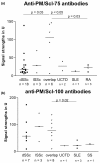Antibodies against PM/Scl-75 and PM/Scl-100 are independent markers for different subsets of systemic sclerosis patients
- PMID: 19220911
- PMCID: PMC2688254
- DOI: 10.1186/ar2614
Antibodies against PM/Scl-75 and PM/Scl-100 are independent markers for different subsets of systemic sclerosis patients
Abstract
Introduction: Anti-PM/Scl antibodies are present in sera from patients with polymyositis (PM), systemic sclerosis (SSc), and PM/SSc overlap syndromes. The prevalence of antibodies against the 75- and 100-kDa PM/Scl proteins and their clinical associations have not been studied in SSc patients in detail so far but could provide a valuable tool for risk assessment in these patients. Furthermore, it remains speculative whether commercially available test systems detecting only anti-PM/Scl-100 antibodies are sufficient in SSc patients.
Methods: Two hundred eighty sera from SSc patients, patients with other connective tissue diseases (n = 209), and healthy blood donors (n = 50) were analyzed for the presence of anti-PM/Scl-75 and anti-PM/Scl-100 antibodies by means of line immunoblot assay. For the SSc patients, possible associations between both subsets of anti-PM/Scl antibodies with clinical and laboratory findings were studied.
Results: The determination of anti-PM/Scl reactivity revealed a diagnostic sensitivity of 12.5% and a specificity of 96.9% for SSc. Among anti-PM/Scl-positive SSc patients, 10.4% and 7.1% were positive for anti-PM/Scl-75 and anti-PM/Scl-100 antibodies, respectively. The highest prevalences of reactivity to PM/Scl were detected in diffuse SSc (19.8%) and overlap syndromes (17.6%). Patients with diffuse SSc showed mainly an anti-PM/Scl-75 response, whereas most cases of overlap syndromes were characterized by reactivity to both PM/Scl antigens. The presence of anti-PM/Scl-75/100 antibodies was associated with muscular and lung involvements as well as with digital ulcers; pulmonary arterial hypertension was found less frequently. Anti-PM/Scl-75 antibodies were detected more frequently in younger and more active patients with joint contractures. Anti-PM/Scl-100 antibodies were associated with creatine kinase elevation; however, gastrointestinal involvements were observed less frequently.
Conclusions: Anti-PM/Scl antibodies are common in distinct SSc subsets and are associated with several clinical symptoms. They are directed mainly to the PM/Scl-75 antigen. Consequently, the detection of anti-PM/Scl antibodies by tests based only on PM/Scl-100 as an antigen source may miss a relevant number of SSc patients positive for these antibodies.
Figures


Comment in
-
The changing landscape of the clinical value of the PM/Scl autoantibody system.Arthritis Res Ther. 2009;11(2):106. doi: 10.1186/ar2646. Epub 2009 Mar 26. Arthritis Res Ther. 2009. PMID: 19351430 Free PMC article.
References
Publication types
MeSH terms
Substances
LinkOut - more resources
Full Text Sources
Other Literature Sources
Research Materials
Miscellaneous

